CNA741, Semester 2: Support Persons' Challenges in Eating Disorders
VerifiedAdded on 2022/12/23
|16
|4603
|28
Report
AI Summary
This academic report delves into the multifaceted challenges encountered by support persons, including families, friends, and caregivers, of individuals grappling with eating disorders. The report begins by outlining the complexities of eating disorders themselves, including anorexia nervosa, bulimia nervosa, and binge eating disorders, and the psychological and physiological impacts on those affected. It then shifts focus to the challenges faced by support persons, such as inadequate health literacy, emotional burdens including feelings of helplessness, anger, and guilt, and the influence of parental behaviors and societal stereotypes. The report highlights the importance of understanding these challenges to foster improved communication, empathy, and ultimately, more effective support for those living with eating disorders. It emphasizes the need for education and awareness to mitigate misperceptions and promote client-centered interventions, ultimately aiming to improve health outcomes and facilitate recovery. The report underscores the importance of addressing both the individual's struggles and the support system's needs to create a more supportive and effective environment for recovery.
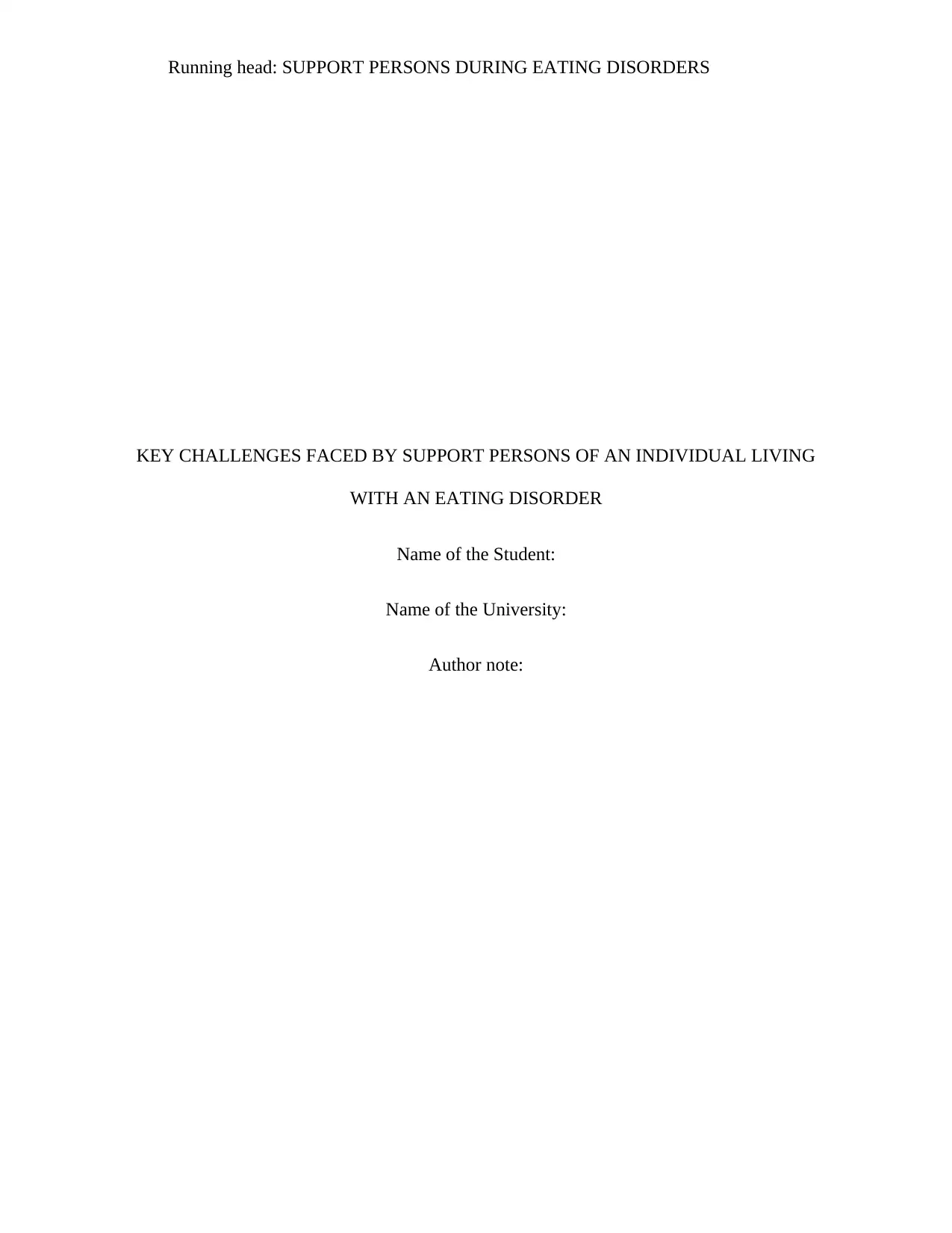
Running head: SUPPORT PERSONS DURING EATING DISORDERS
KEY CHALLENGES FACED BY SUPPORT PERSONS OF AN INDIVIDUAL LIVING
WITH AN EATING DISORDER
Name of the Student:
Name of the University:
Author note:
KEY CHALLENGES FACED BY SUPPORT PERSONS OF AN INDIVIDUAL LIVING
WITH AN EATING DISORDER
Name of the Student:
Name of the University:
Author note:
Paraphrase This Document
Need a fresh take? Get an instant paraphrase of this document with our AI Paraphraser
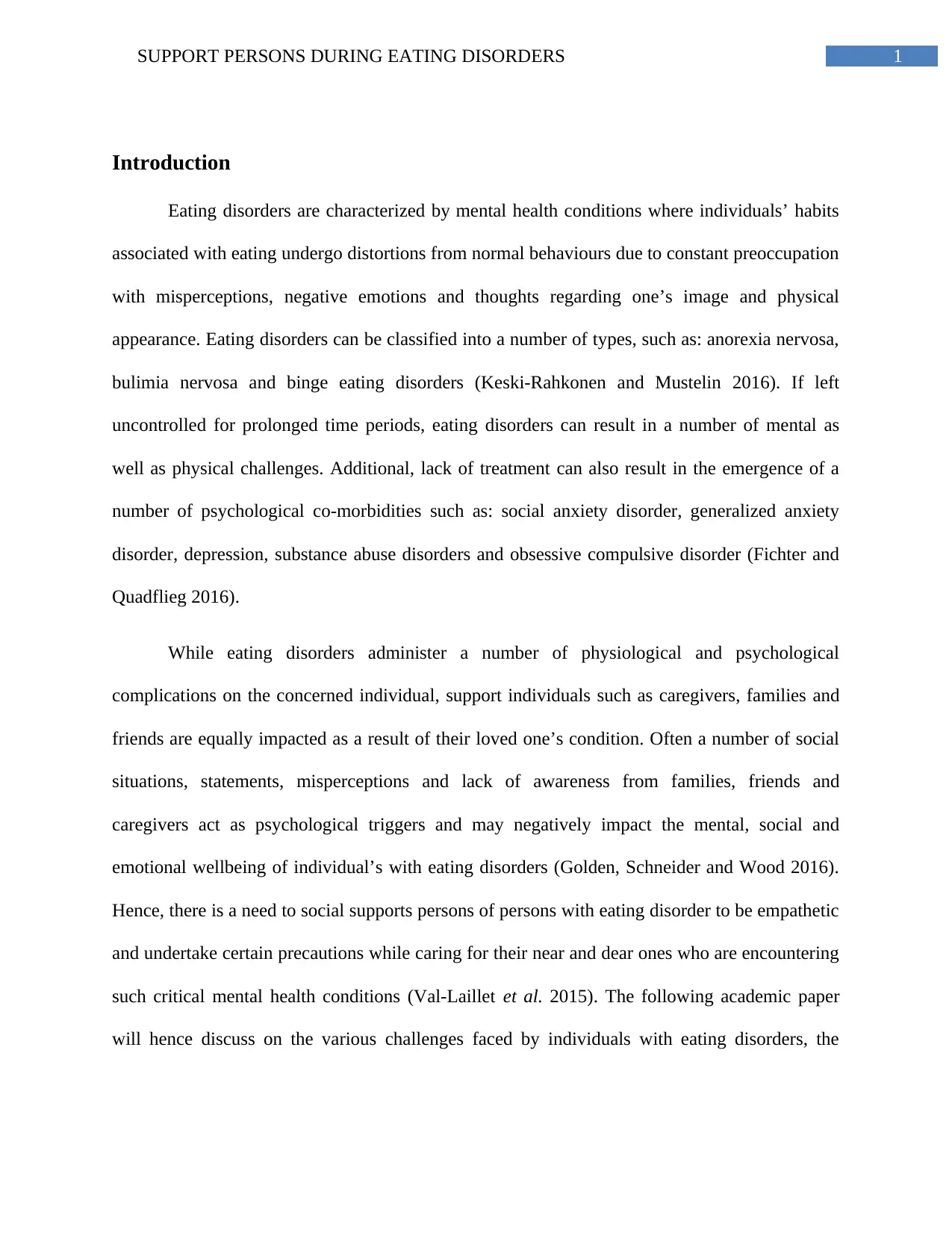
1SUPPORT PERSONS DURING EATING DISORDERS
Introduction
Eating disorders are characterized by mental health conditions where individuals’ habits
associated with eating undergo distortions from normal behaviours due to constant preoccupation
with misperceptions, negative emotions and thoughts regarding one’s image and physical
appearance. Eating disorders can be classified into a number of types, such as: anorexia nervosa,
bulimia nervosa and binge eating disorders (Keski-Rahkonen and Mustelin 2016). If left
uncontrolled for prolonged time periods, eating disorders can result in a number of mental as
well as physical challenges. Additional, lack of treatment can also result in the emergence of a
number of psychological co-morbidities such as: social anxiety disorder, generalized anxiety
disorder, depression, substance abuse disorders and obsessive compulsive disorder (Fichter and
Quadflieg 2016).
While eating disorders administer a number of physiological and psychological
complications on the concerned individual, support individuals such as caregivers, families and
friends are equally impacted as a result of their loved one’s condition. Often a number of social
situations, statements, misperceptions and lack of awareness from families, friends and
caregivers act as psychological triggers and may negatively impact the mental, social and
emotional wellbeing of individual’s with eating disorders (Golden, Schneider and Wood 2016).
Hence, there is a need to social supports persons of persons with eating disorder to be empathetic
and undertake certain precautions while caring for their near and dear ones who are encountering
such critical mental health conditions (Val-Laillet et al. 2015). The following academic paper
will hence discuss on the various challenges faced by individuals with eating disorders, the
Introduction
Eating disorders are characterized by mental health conditions where individuals’ habits
associated with eating undergo distortions from normal behaviours due to constant preoccupation
with misperceptions, negative emotions and thoughts regarding one’s image and physical
appearance. Eating disorders can be classified into a number of types, such as: anorexia nervosa,
bulimia nervosa and binge eating disorders (Keski-Rahkonen and Mustelin 2016). If left
uncontrolled for prolonged time periods, eating disorders can result in a number of mental as
well as physical challenges. Additional, lack of treatment can also result in the emergence of a
number of psychological co-morbidities such as: social anxiety disorder, generalized anxiety
disorder, depression, substance abuse disorders and obsessive compulsive disorder (Fichter and
Quadflieg 2016).
While eating disorders administer a number of physiological and psychological
complications on the concerned individual, support individuals such as caregivers, families and
friends are equally impacted as a result of their loved one’s condition. Often a number of social
situations, statements, misperceptions and lack of awareness from families, friends and
caregivers act as psychological triggers and may negatively impact the mental, social and
emotional wellbeing of individual’s with eating disorders (Golden, Schneider and Wood 2016).
Hence, there is a need to social supports persons of persons with eating disorder to be empathetic
and undertake certain precautions while caring for their near and dear ones who are encountering
such critical mental health conditions (Val-Laillet et al. 2015). The following academic paper
will hence discuss on the various challenges faced by individuals with eating disorders, the
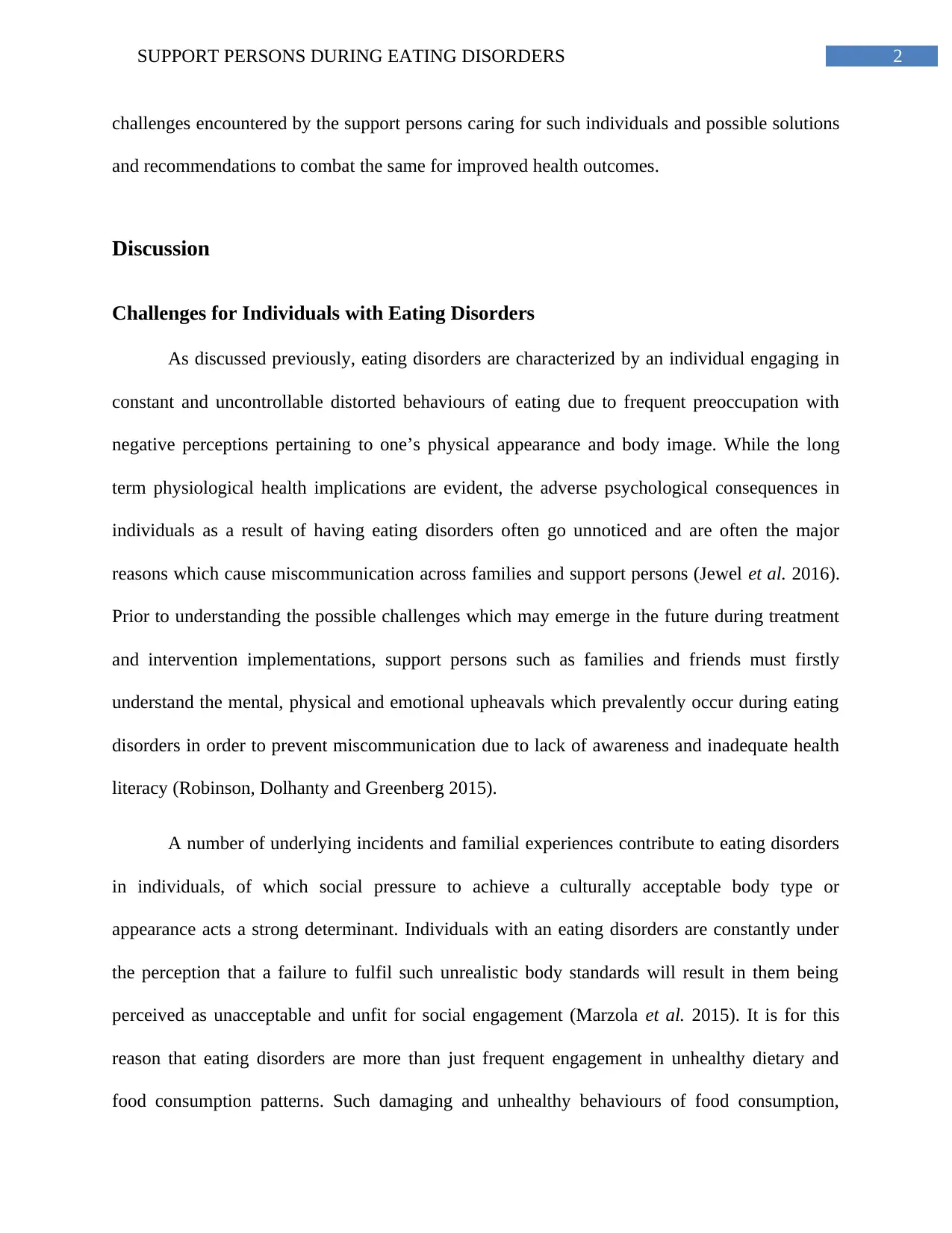
2SUPPORT PERSONS DURING EATING DISORDERS
challenges encountered by the support persons caring for such individuals and possible solutions
and recommendations to combat the same for improved health outcomes.
Discussion
Challenges for Individuals with Eating Disorders
As discussed previously, eating disorders are characterized by an individual engaging in
constant and uncontrollable distorted behaviours of eating due to frequent preoccupation with
negative perceptions pertaining to one’s physical appearance and body image. While the long
term physiological health implications are evident, the adverse psychological consequences in
individuals as a result of having eating disorders often go unnoticed and are often the major
reasons which cause miscommunication across families and support persons (Jewel et al. 2016).
Prior to understanding the possible challenges which may emerge in the future during treatment
and intervention implementations, support persons such as families and friends must firstly
understand the mental, physical and emotional upheavals which prevalently occur during eating
disorders in order to prevent miscommunication due to lack of awareness and inadequate health
literacy (Robinson, Dolhanty and Greenberg 2015).
A number of underlying incidents and familial experiences contribute to eating disorders
in individuals, of which social pressure to achieve a culturally acceptable body type or
appearance acts a strong determinant. Individuals with an eating disorders are constantly under
the perception that a failure to fulfil such unrealistic body standards will result in them being
perceived as unacceptable and unfit for social engagement (Marzola et al. 2015). It is for this
reason that eating disorders are more than just frequent engagement in unhealthy dietary and
food consumption patterns. Such damaging and unhealthy behaviours of food consumption,
challenges encountered by the support persons caring for such individuals and possible solutions
and recommendations to combat the same for improved health outcomes.
Discussion
Challenges for Individuals with Eating Disorders
As discussed previously, eating disorders are characterized by an individual engaging in
constant and uncontrollable distorted behaviours of eating due to frequent preoccupation with
negative perceptions pertaining to one’s physical appearance and body image. While the long
term physiological health implications are evident, the adverse psychological consequences in
individuals as a result of having eating disorders often go unnoticed and are often the major
reasons which cause miscommunication across families and support persons (Jewel et al. 2016).
Prior to understanding the possible challenges which may emerge in the future during treatment
and intervention implementations, support persons such as families and friends must firstly
understand the mental, physical and emotional upheavals which prevalently occur during eating
disorders in order to prevent miscommunication due to lack of awareness and inadequate health
literacy (Robinson, Dolhanty and Greenberg 2015).
A number of underlying incidents and familial experiences contribute to eating disorders
in individuals, of which social pressure to achieve a culturally acceptable body type or
appearance acts a strong determinant. Individuals with an eating disorders are constantly under
the perception that a failure to fulfil such unrealistic body standards will result in them being
perceived as unacceptable and unfit for social engagement (Marzola et al. 2015). It is for this
reason that eating disorders are more than just frequent engagement in unhealthy dietary and
food consumption patterns. Such damaging and unhealthy behaviours of food consumption,
⊘ This is a preview!⊘
Do you want full access?
Subscribe today to unlock all pages.

Trusted by 1+ million students worldwide
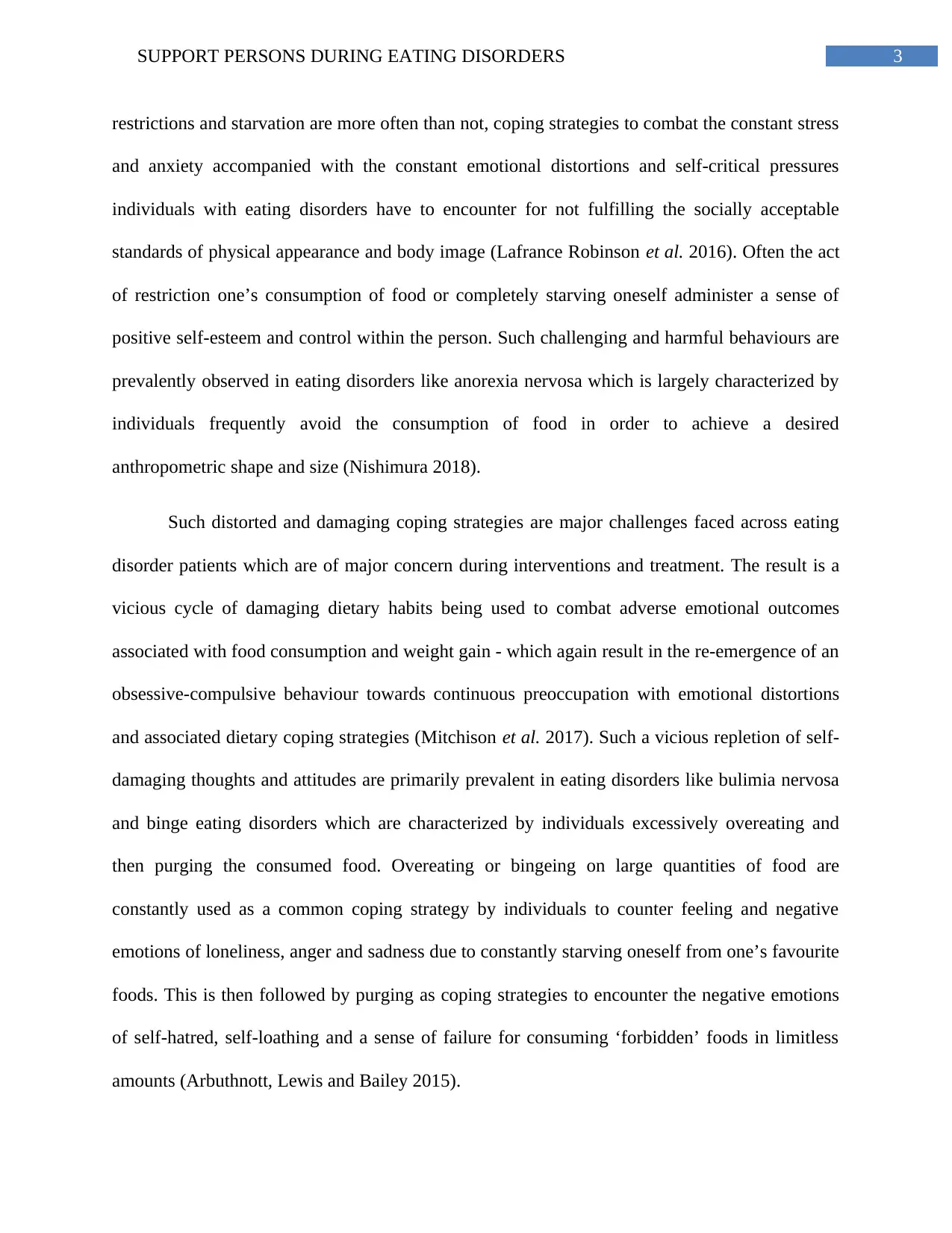
3SUPPORT PERSONS DURING EATING DISORDERS
restrictions and starvation are more often than not, coping strategies to combat the constant stress
and anxiety accompanied with the constant emotional distortions and self-critical pressures
individuals with eating disorders have to encounter for not fulfilling the socially acceptable
standards of physical appearance and body image (Lafrance Robinson et al. 2016). Often the act
of restriction one’s consumption of food or completely starving oneself administer a sense of
positive self-esteem and control within the person. Such challenging and harmful behaviours are
prevalently observed in eating disorders like anorexia nervosa which is largely characterized by
individuals frequently avoid the consumption of food in order to achieve a desired
anthropometric shape and size (Nishimura 2018).
Such distorted and damaging coping strategies are major challenges faced across eating
disorder patients which are of major concern during interventions and treatment. The result is a
vicious cycle of damaging dietary habits being used to combat adverse emotional outcomes
associated with food consumption and weight gain - which again result in the re-emergence of an
obsessive-compulsive behaviour towards continuous preoccupation with emotional distortions
and associated dietary coping strategies (Mitchison et al. 2017). Such a vicious repletion of self-
damaging thoughts and attitudes are primarily prevalent in eating disorders like bulimia nervosa
and binge eating disorders which are characterized by individuals excessively overeating and
then purging the consumed food. Overeating or bingeing on large quantities of food are
constantly used as a common coping strategy by individuals to counter feeling and negative
emotions of loneliness, anger and sadness due to constantly starving oneself from one’s favourite
foods. This is then followed by purging as coping strategies to encounter the negative emotions
of self-hatred, self-loathing and a sense of failure for consuming ‘forbidden’ foods in limitless
amounts (Arbuthnott, Lewis and Bailey 2015).
restrictions and starvation are more often than not, coping strategies to combat the constant stress
and anxiety accompanied with the constant emotional distortions and self-critical pressures
individuals with eating disorders have to encounter for not fulfilling the socially acceptable
standards of physical appearance and body image (Lafrance Robinson et al. 2016). Often the act
of restriction one’s consumption of food or completely starving oneself administer a sense of
positive self-esteem and control within the person. Such challenging and harmful behaviours are
prevalently observed in eating disorders like anorexia nervosa which is largely characterized by
individuals frequently avoid the consumption of food in order to achieve a desired
anthropometric shape and size (Nishimura 2018).
Such distorted and damaging coping strategies are major challenges faced across eating
disorder patients which are of major concern during interventions and treatment. The result is a
vicious cycle of damaging dietary habits being used to combat adverse emotional outcomes
associated with food consumption and weight gain - which again result in the re-emergence of an
obsessive-compulsive behaviour towards continuous preoccupation with emotional distortions
and associated dietary coping strategies (Mitchison et al. 2017). Such a vicious repletion of self-
damaging thoughts and attitudes are primarily prevalent in eating disorders like bulimia nervosa
and binge eating disorders which are characterized by individuals excessively overeating and
then purging the consumed food. Overeating or bingeing on large quantities of food are
constantly used as a common coping strategy by individuals to counter feeling and negative
emotions of loneliness, anger and sadness due to constantly starving oneself from one’s favourite
foods. This is then followed by purging as coping strategies to encounter the negative emotions
of self-hatred, self-loathing and a sense of failure for consuming ‘forbidden’ foods in limitless
amounts (Arbuthnott, Lewis and Bailey 2015).
Paraphrase This Document
Need a fresh take? Get an instant paraphrase of this document with our AI Paraphraser
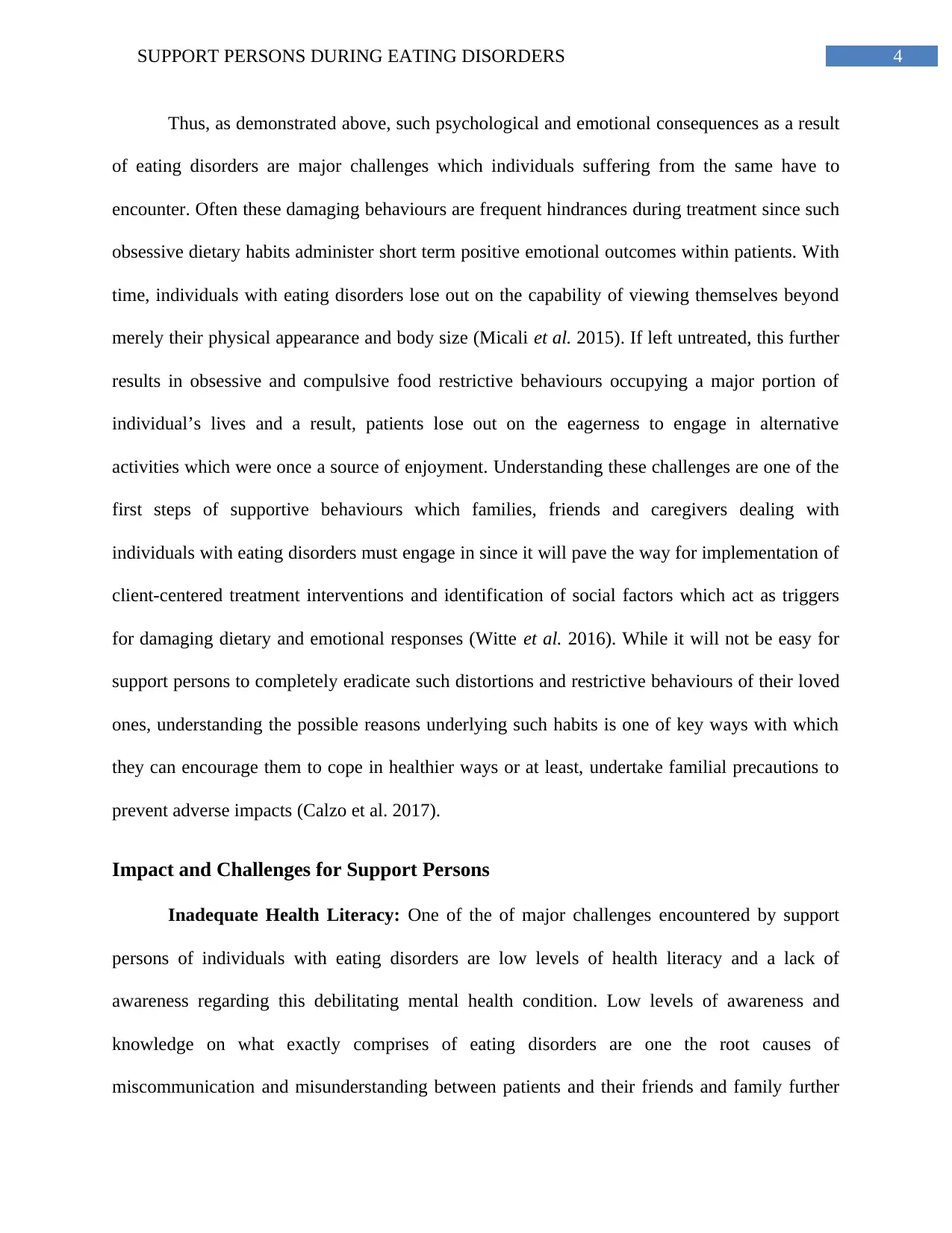
4SUPPORT PERSONS DURING EATING DISORDERS
Thus, as demonstrated above, such psychological and emotional consequences as a result
of eating disorders are major challenges which individuals suffering from the same have to
encounter. Often these damaging behaviours are frequent hindrances during treatment since such
obsessive dietary habits administer short term positive emotional outcomes within patients. With
time, individuals with eating disorders lose out on the capability of viewing themselves beyond
merely their physical appearance and body size (Micali et al. 2015). If left untreated, this further
results in obsessive and compulsive food restrictive behaviours occupying a major portion of
individual’s lives and a result, patients lose out on the eagerness to engage in alternative
activities which were once a source of enjoyment. Understanding these challenges are one of the
first steps of supportive behaviours which families, friends and caregivers dealing with
individuals with eating disorders must engage in since it will pave the way for implementation of
client-centered treatment interventions and identification of social factors which act as triggers
for damaging dietary and emotional responses (Witte et al. 2016). While it will not be easy for
support persons to completely eradicate such distortions and restrictive behaviours of their loved
ones, understanding the possible reasons underlying such habits is one of key ways with which
they can encourage them to cope in healthier ways or at least, undertake familial precautions to
prevent adverse impacts (Calzo et al. 2017).
Impact and Challenges for Support Persons
Inadequate Health Literacy: One of the of major challenges encountered by support
persons of individuals with eating disorders are low levels of health literacy and a lack of
awareness regarding this debilitating mental health condition. Low levels of awareness and
knowledge on what exactly comprises of eating disorders are one the root causes of
miscommunication and misunderstanding between patients and their friends and family further
Thus, as demonstrated above, such psychological and emotional consequences as a result
of eating disorders are major challenges which individuals suffering from the same have to
encounter. Often these damaging behaviours are frequent hindrances during treatment since such
obsessive dietary habits administer short term positive emotional outcomes within patients. With
time, individuals with eating disorders lose out on the capability of viewing themselves beyond
merely their physical appearance and body size (Micali et al. 2015). If left untreated, this further
results in obsessive and compulsive food restrictive behaviours occupying a major portion of
individual’s lives and a result, patients lose out on the eagerness to engage in alternative
activities which were once a source of enjoyment. Understanding these challenges are one of the
first steps of supportive behaviours which families, friends and caregivers dealing with
individuals with eating disorders must engage in since it will pave the way for implementation of
client-centered treatment interventions and identification of social factors which act as triggers
for damaging dietary and emotional responses (Witte et al. 2016). While it will not be easy for
support persons to completely eradicate such distortions and restrictive behaviours of their loved
ones, understanding the possible reasons underlying such habits is one of key ways with which
they can encourage them to cope in healthier ways or at least, undertake familial precautions to
prevent adverse impacts (Calzo et al. 2017).
Impact and Challenges for Support Persons
Inadequate Health Literacy: One of the of major challenges encountered by support
persons of individuals with eating disorders are low levels of health literacy and a lack of
awareness regarding this debilitating mental health condition. Low levels of awareness and
knowledge on what exactly comprises of eating disorders are one the root causes of
miscommunication and misunderstanding between patients and their friends and family further
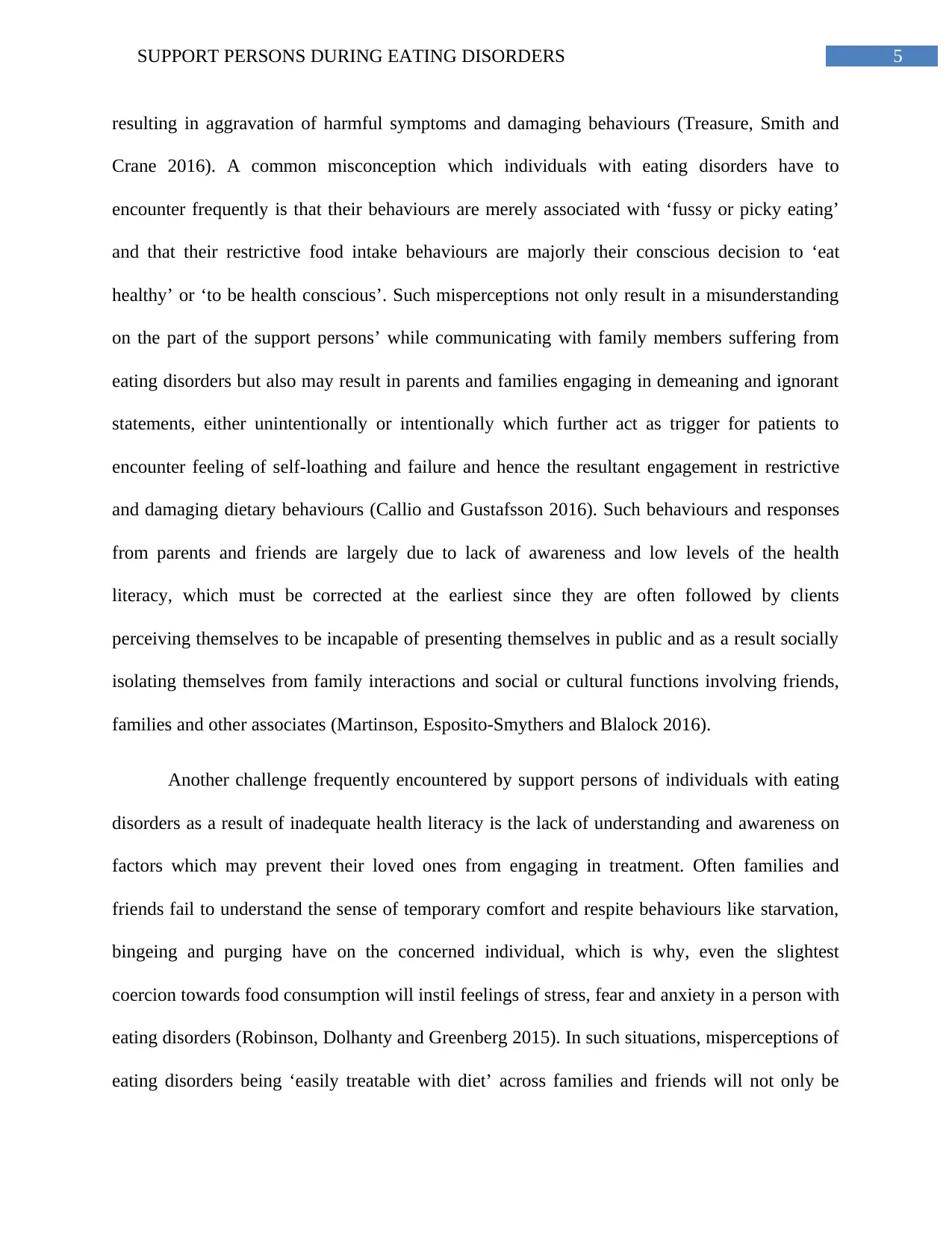
5SUPPORT PERSONS DURING EATING DISORDERS
resulting in aggravation of harmful symptoms and damaging behaviours (Treasure, Smith and
Crane 2016). A common misconception which individuals with eating disorders have to
encounter frequently is that their behaviours are merely associated with ‘fussy or picky eating’
and that their restrictive food intake behaviours are majorly their conscious decision to ‘eat
healthy’ or ‘to be health conscious’. Such misperceptions not only result in a misunderstanding
on the part of the support persons’ while communicating with family members suffering from
eating disorders but also may result in parents and families engaging in demeaning and ignorant
statements, either unintentionally or intentionally which further act as trigger for patients to
encounter feeling of self-loathing and failure and hence the resultant engagement in restrictive
and damaging dietary behaviours (Callio and Gustafsson 2016). Such behaviours and responses
from parents and friends are largely due to lack of awareness and low levels of the health
literacy, which must be corrected at the earliest since they are often followed by clients
perceiving themselves to be incapable of presenting themselves in public and as a result socially
isolating themselves from family interactions and social or cultural functions involving friends,
families and other associates (Martinson, Esposito-Smythers and Blalock 2016).
Another challenge frequently encountered by support persons of individuals with eating
disorders as a result of inadequate health literacy is the lack of understanding and awareness on
factors which may prevent their loved ones from engaging in treatment. Often families and
friends fail to understand the sense of temporary comfort and respite behaviours like starvation,
bingeing and purging have on the concerned individual, which is why, even the slightest
coercion towards food consumption will instil feelings of stress, fear and anxiety in a person with
eating disorders (Robinson, Dolhanty and Greenberg 2015). In such situations, misperceptions of
eating disorders being ‘easily treatable with diet’ across families and friends will not only be
resulting in aggravation of harmful symptoms and damaging behaviours (Treasure, Smith and
Crane 2016). A common misconception which individuals with eating disorders have to
encounter frequently is that their behaviours are merely associated with ‘fussy or picky eating’
and that their restrictive food intake behaviours are majorly their conscious decision to ‘eat
healthy’ or ‘to be health conscious’. Such misperceptions not only result in a misunderstanding
on the part of the support persons’ while communicating with family members suffering from
eating disorders but also may result in parents and families engaging in demeaning and ignorant
statements, either unintentionally or intentionally which further act as trigger for patients to
encounter feeling of self-loathing and failure and hence the resultant engagement in restrictive
and damaging dietary behaviours (Callio and Gustafsson 2016). Such behaviours and responses
from parents and friends are largely due to lack of awareness and low levels of the health
literacy, which must be corrected at the earliest since they are often followed by clients
perceiving themselves to be incapable of presenting themselves in public and as a result socially
isolating themselves from family interactions and social or cultural functions involving friends,
families and other associates (Martinson, Esposito-Smythers and Blalock 2016).
Another challenge frequently encountered by support persons of individuals with eating
disorders as a result of inadequate health literacy is the lack of understanding and awareness on
factors which may prevent their loved ones from engaging in treatment. Often families and
friends fail to understand the sense of temporary comfort and respite behaviours like starvation,
bingeing and purging have on the concerned individual, which is why, even the slightest
coercion towards food consumption will instil feelings of stress, fear and anxiety in a person with
eating disorders (Robinson, Dolhanty and Greenberg 2015). In such situations, misperceptions of
eating disorders being ‘easily treatable with diet’ across families and friends will not only be
⊘ This is a preview!⊘
Do you want full access?
Subscribe today to unlock all pages.

Trusted by 1+ million students worldwide
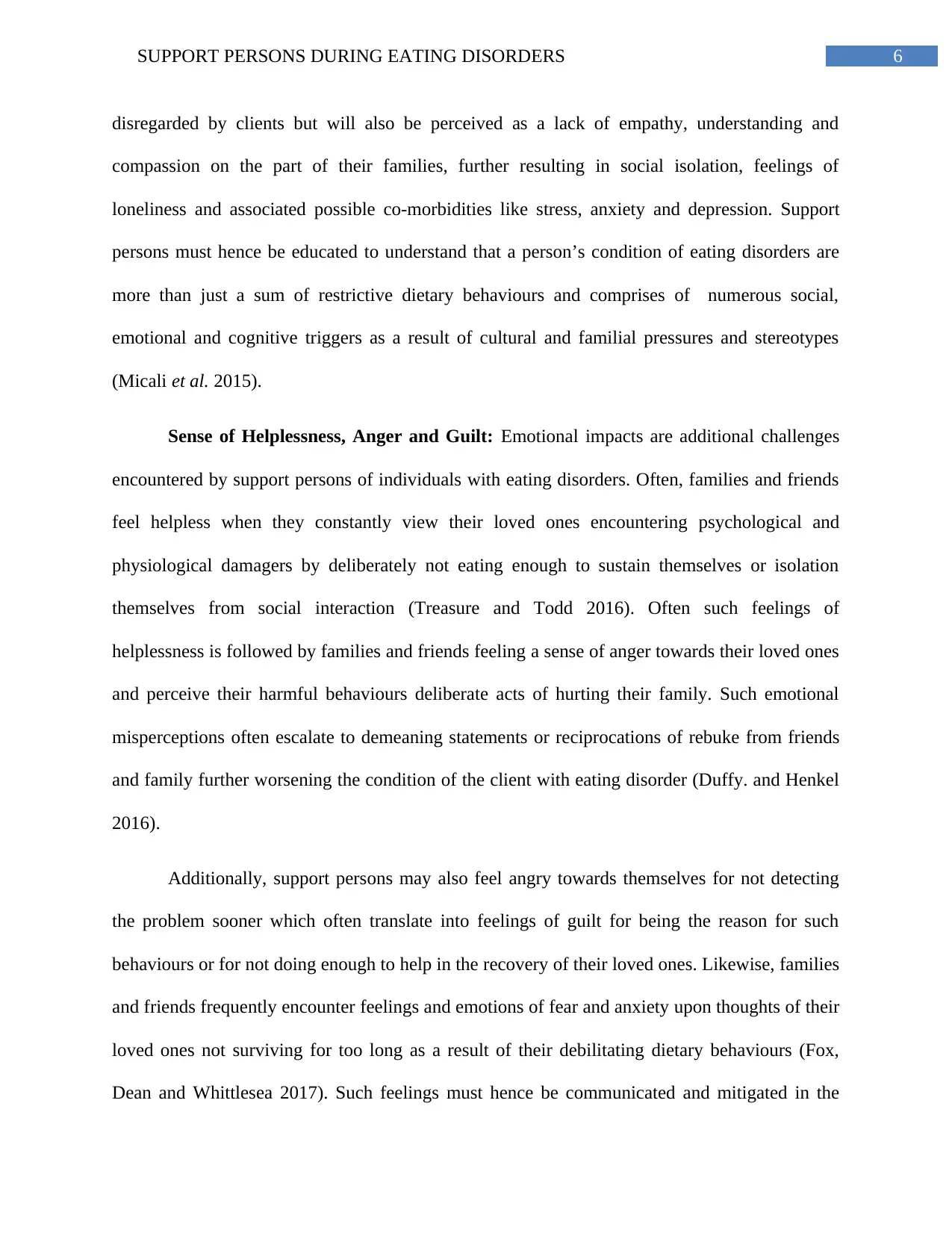
6SUPPORT PERSONS DURING EATING DISORDERS
disregarded by clients but will also be perceived as a lack of empathy, understanding and
compassion on the part of their families, further resulting in social isolation, feelings of
loneliness and associated possible co-morbidities like stress, anxiety and depression. Support
persons must hence be educated to understand that a person’s condition of eating disorders are
more than just a sum of restrictive dietary behaviours and comprises of numerous social,
emotional and cognitive triggers as a result of cultural and familial pressures and stereotypes
(Micali et al. 2015).
Sense of Helplessness, Anger and Guilt: Emotional impacts are additional challenges
encountered by support persons of individuals with eating disorders. Often, families and friends
feel helpless when they constantly view their loved ones encountering psychological and
physiological damagers by deliberately not eating enough to sustain themselves or isolation
themselves from social interaction (Treasure and Todd 2016). Often such feelings of
helplessness is followed by families and friends feeling a sense of anger towards their loved ones
and perceive their harmful behaviours deliberate acts of hurting their family. Such emotional
misperceptions often escalate to demeaning statements or reciprocations of rebuke from friends
and family further worsening the condition of the client with eating disorder (Duffy. and Henkel
2016).
Additionally, support persons may also feel angry towards themselves for not detecting
the problem sooner which often translate into feelings of guilt for being the reason for such
behaviours or for not doing enough to help in the recovery of their loved ones. Likewise, families
and friends frequently encounter feelings and emotions of fear and anxiety upon thoughts of their
loved ones not surviving for too long as a result of their debilitating dietary behaviours (Fox,
Dean and Whittlesea 2017). Such feelings must hence be communicated and mitigated in the
disregarded by clients but will also be perceived as a lack of empathy, understanding and
compassion on the part of their families, further resulting in social isolation, feelings of
loneliness and associated possible co-morbidities like stress, anxiety and depression. Support
persons must hence be educated to understand that a person’s condition of eating disorders are
more than just a sum of restrictive dietary behaviours and comprises of numerous social,
emotional and cognitive triggers as a result of cultural and familial pressures and stereotypes
(Micali et al. 2015).
Sense of Helplessness, Anger and Guilt: Emotional impacts are additional challenges
encountered by support persons of individuals with eating disorders. Often, families and friends
feel helpless when they constantly view their loved ones encountering psychological and
physiological damagers by deliberately not eating enough to sustain themselves or isolation
themselves from social interaction (Treasure and Todd 2016). Often such feelings of
helplessness is followed by families and friends feeling a sense of anger towards their loved ones
and perceive their harmful behaviours deliberate acts of hurting their family. Such emotional
misperceptions often escalate to demeaning statements or reciprocations of rebuke from friends
and family further worsening the condition of the client with eating disorder (Duffy. and Henkel
2016).
Additionally, support persons may also feel angry towards themselves for not detecting
the problem sooner which often translate into feelings of guilt for being the reason for such
behaviours or for not doing enough to help in the recovery of their loved ones. Likewise, families
and friends frequently encounter feelings and emotions of fear and anxiety upon thoughts of their
loved ones not surviving for too long as a result of their debilitating dietary behaviours (Fox,
Dean and Whittlesea 2017). Such feelings must hence be communicated and mitigated in the
Paraphrase This Document
Need a fresh take? Get an instant paraphrase of this document with our AI Paraphraser
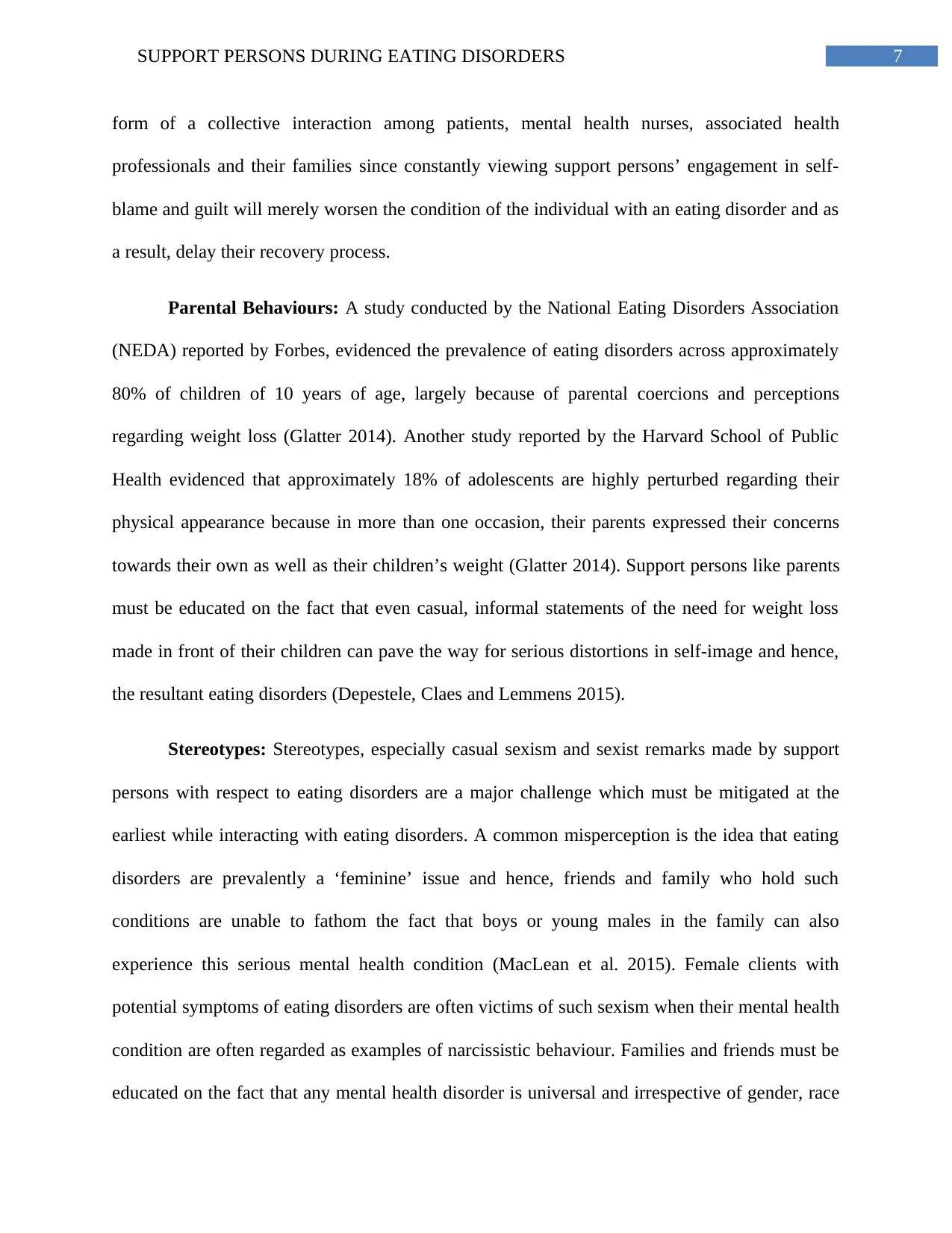
7SUPPORT PERSONS DURING EATING DISORDERS
form of a collective interaction among patients, mental health nurses, associated health
professionals and their families since constantly viewing support persons’ engagement in self-
blame and guilt will merely worsen the condition of the individual with an eating disorder and as
a result, delay their recovery process.
Parental Behaviours: A study conducted by the National Eating Disorders Association
(NEDA) reported by Forbes, evidenced the prevalence of eating disorders across approximately
80% of children of 10 years of age, largely because of parental coercions and perceptions
regarding weight loss (Glatter 2014). Another study reported by the Harvard School of Public
Health evidenced that approximately 18% of adolescents are highly perturbed regarding their
physical appearance because in more than one occasion, their parents expressed their concerns
towards their own as well as their children’s weight (Glatter 2014). Support persons like parents
must be educated on the fact that even casual, informal statements of the need for weight loss
made in front of their children can pave the way for serious distortions in self-image and hence,
the resultant eating disorders (Depestele, Claes and Lemmens 2015).
Stereotypes: Stereotypes, especially casual sexism and sexist remarks made by support
persons with respect to eating disorders are a major challenge which must be mitigated at the
earliest while interacting with eating disorders. A common misperception is the idea that eating
disorders are prevalently a ‘feminine’ issue and hence, friends and family who hold such
conditions are unable to fathom the fact that boys or young males in the family can also
experience this serious mental health condition (MacLean et al. 2015). Female clients with
potential symptoms of eating disorders are often victims of such sexism when their mental health
condition are often regarded as examples of narcissistic behaviour. Families and friends must be
educated on the fact that any mental health disorder is universal and irrespective of gender, race
form of a collective interaction among patients, mental health nurses, associated health
professionals and their families since constantly viewing support persons’ engagement in self-
blame and guilt will merely worsen the condition of the individual with an eating disorder and as
a result, delay their recovery process.
Parental Behaviours: A study conducted by the National Eating Disorders Association
(NEDA) reported by Forbes, evidenced the prevalence of eating disorders across approximately
80% of children of 10 years of age, largely because of parental coercions and perceptions
regarding weight loss (Glatter 2014). Another study reported by the Harvard School of Public
Health evidenced that approximately 18% of adolescents are highly perturbed regarding their
physical appearance because in more than one occasion, their parents expressed their concerns
towards their own as well as their children’s weight (Glatter 2014). Support persons like parents
must be educated on the fact that even casual, informal statements of the need for weight loss
made in front of their children can pave the way for serious distortions in self-image and hence,
the resultant eating disorders (Depestele, Claes and Lemmens 2015).
Stereotypes: Stereotypes, especially casual sexism and sexist remarks made by support
persons with respect to eating disorders are a major challenge which must be mitigated at the
earliest while interacting with eating disorders. A common misperception is the idea that eating
disorders are prevalently a ‘feminine’ issue and hence, friends and family who hold such
conditions are unable to fathom the fact that boys or young males in the family can also
experience this serious mental health condition (MacLean et al. 2015). Female clients with
potential symptoms of eating disorders are often victims of such sexism when their mental health
condition are often regarded as examples of narcissistic behaviour. Families and friends must be
educated on the fact that any mental health disorder is universal and irrespective of gender, race
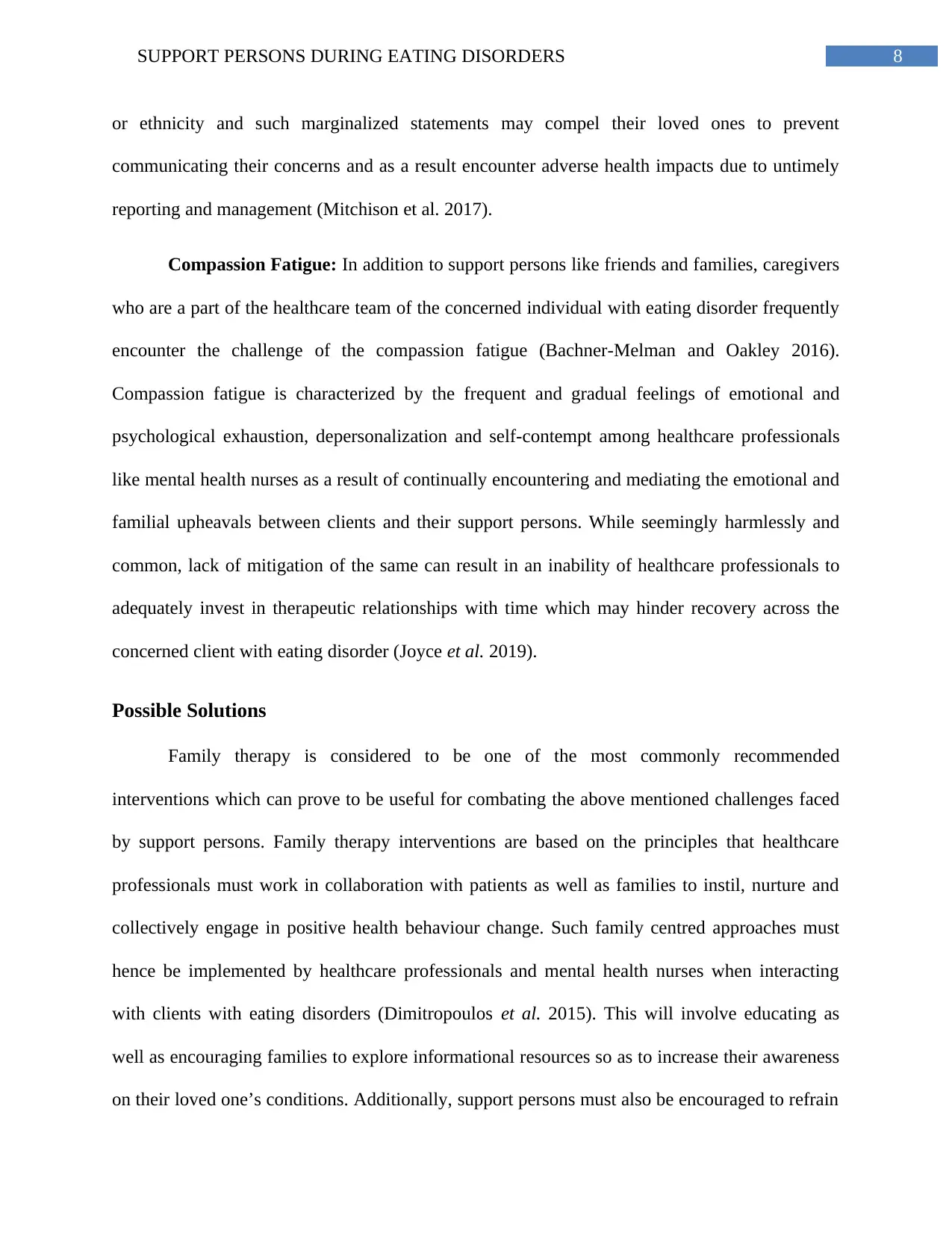
8SUPPORT PERSONS DURING EATING DISORDERS
or ethnicity and such marginalized statements may compel their loved ones to prevent
communicating their concerns and as a result encounter adverse health impacts due to untimely
reporting and management (Mitchison et al. 2017).
Compassion Fatigue: In addition to support persons like friends and families, caregivers
who are a part of the healthcare team of the concerned individual with eating disorder frequently
encounter the challenge of the compassion fatigue (Bachner-Melman and Oakley 2016).
Compassion fatigue is characterized by the frequent and gradual feelings of emotional and
psychological exhaustion, depersonalization and self-contempt among healthcare professionals
like mental health nurses as a result of continually encountering and mediating the emotional and
familial upheavals between clients and their support persons. While seemingly harmlessly and
common, lack of mitigation of the same can result in an inability of healthcare professionals to
adequately invest in therapeutic relationships with time which may hinder recovery across the
concerned client with eating disorder (Joyce et al. 2019).
Possible Solutions
Family therapy is considered to be one of the most commonly recommended
interventions which can prove to be useful for combating the above mentioned challenges faced
by support persons. Family therapy interventions are based on the principles that healthcare
professionals must work in collaboration with patients as well as families to instil, nurture and
collectively engage in positive health behaviour change. Such family centred approaches must
hence be implemented by healthcare professionals and mental health nurses when interacting
with clients with eating disorders (Dimitropoulos et al. 2015). This will involve educating as
well as encouraging families to explore informational resources so as to increase their awareness
on their loved one’s conditions. Additionally, support persons must also be encouraged to refrain
or ethnicity and such marginalized statements may compel their loved ones to prevent
communicating their concerns and as a result encounter adverse health impacts due to untimely
reporting and management (Mitchison et al. 2017).
Compassion Fatigue: In addition to support persons like friends and families, caregivers
who are a part of the healthcare team of the concerned individual with eating disorder frequently
encounter the challenge of the compassion fatigue (Bachner-Melman and Oakley 2016).
Compassion fatigue is characterized by the frequent and gradual feelings of emotional and
psychological exhaustion, depersonalization and self-contempt among healthcare professionals
like mental health nurses as a result of continually encountering and mediating the emotional and
familial upheavals between clients and their support persons. While seemingly harmlessly and
common, lack of mitigation of the same can result in an inability of healthcare professionals to
adequately invest in therapeutic relationships with time which may hinder recovery across the
concerned client with eating disorder (Joyce et al. 2019).
Possible Solutions
Family therapy is considered to be one of the most commonly recommended
interventions which can prove to be useful for combating the above mentioned challenges faced
by support persons. Family therapy interventions are based on the principles that healthcare
professionals must work in collaboration with patients as well as families to instil, nurture and
collectively engage in positive health behaviour change. Such family centred approaches must
hence be implemented by healthcare professionals and mental health nurses when interacting
with clients with eating disorders (Dimitropoulos et al. 2015). This will involve educating as
well as encouraging families to explore informational resources so as to increase their awareness
on their loved one’s conditions. Additionally, support persons must also be encouraged to refrain
⊘ This is a preview!⊘
Do you want full access?
Subscribe today to unlock all pages.

Trusted by 1+ million students worldwide
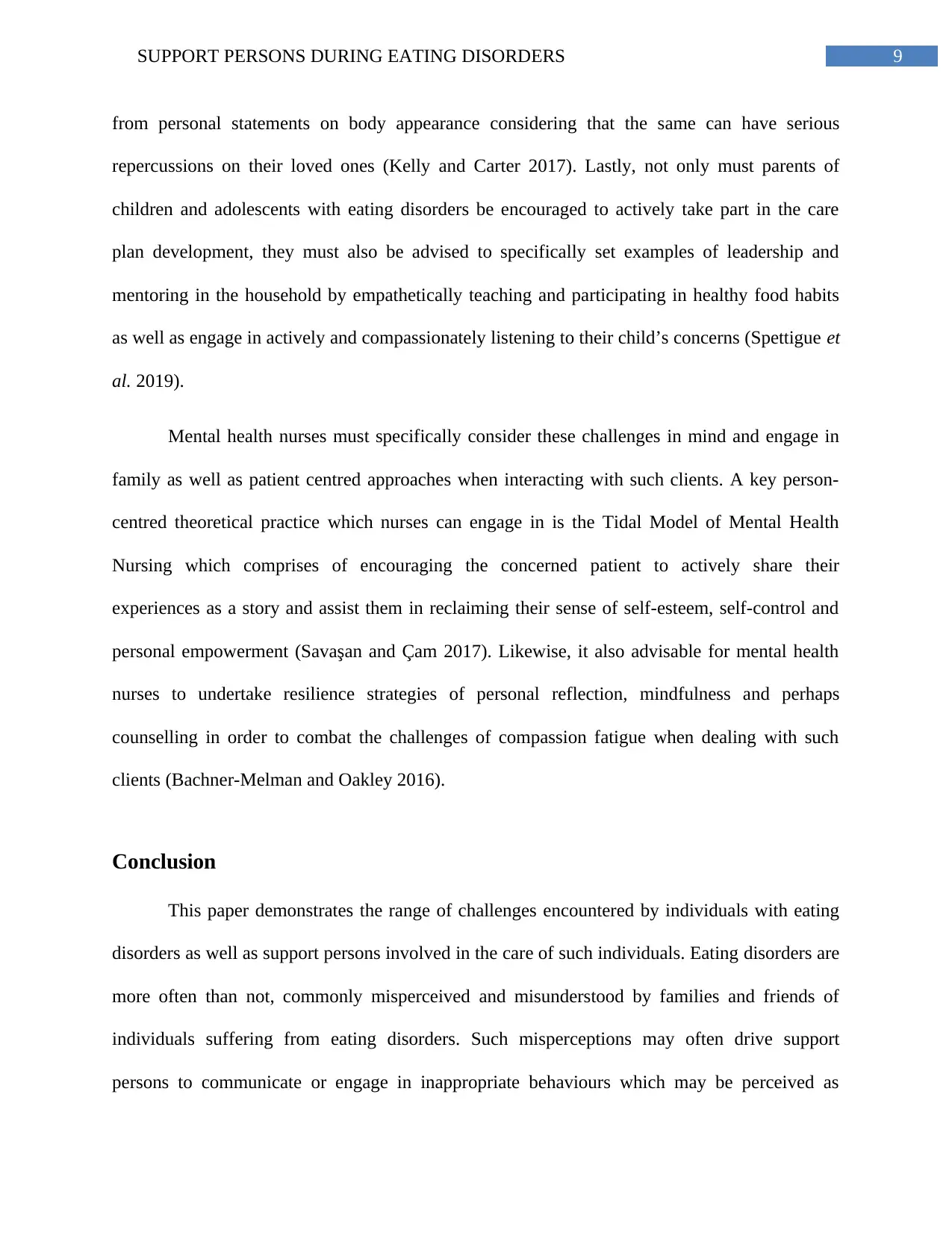
9SUPPORT PERSONS DURING EATING DISORDERS
from personal statements on body appearance considering that the same can have serious
repercussions on their loved ones (Kelly and Carter 2017). Lastly, not only must parents of
children and adolescents with eating disorders be encouraged to actively take part in the care
plan development, they must also be advised to specifically set examples of leadership and
mentoring in the household by empathetically teaching and participating in healthy food habits
as well as engage in actively and compassionately listening to their child’s concerns (Spettigue et
al. 2019).
Mental health nurses must specifically consider these challenges in mind and engage in
family as well as patient centred approaches when interacting with such clients. A key person-
centred theoretical practice which nurses can engage in is the Tidal Model of Mental Health
Nursing which comprises of encouraging the concerned patient to actively share their
experiences as a story and assist them in reclaiming their sense of self-esteem, self-control and
personal empowerment (Savaşan and Çam 2017). Likewise, it also advisable for mental health
nurses to undertake resilience strategies of personal reflection, mindfulness and perhaps
counselling in order to combat the challenges of compassion fatigue when dealing with such
clients (Bachner-Melman and Oakley 2016).
Conclusion
This paper demonstrates the range of challenges encountered by individuals with eating
disorders as well as support persons involved in the care of such individuals. Eating disorders are
more often than not, commonly misperceived and misunderstood by families and friends of
individuals suffering from eating disorders. Such misperceptions may often drive support
persons to communicate or engage in inappropriate behaviours which may be perceived as
from personal statements on body appearance considering that the same can have serious
repercussions on their loved ones (Kelly and Carter 2017). Lastly, not only must parents of
children and adolescents with eating disorders be encouraged to actively take part in the care
plan development, they must also be advised to specifically set examples of leadership and
mentoring in the household by empathetically teaching and participating in healthy food habits
as well as engage in actively and compassionately listening to their child’s concerns (Spettigue et
al. 2019).
Mental health nurses must specifically consider these challenges in mind and engage in
family as well as patient centred approaches when interacting with such clients. A key person-
centred theoretical practice which nurses can engage in is the Tidal Model of Mental Health
Nursing which comprises of encouraging the concerned patient to actively share their
experiences as a story and assist them in reclaiming their sense of self-esteem, self-control and
personal empowerment (Savaşan and Çam 2017). Likewise, it also advisable for mental health
nurses to undertake resilience strategies of personal reflection, mindfulness and perhaps
counselling in order to combat the challenges of compassion fatigue when dealing with such
clients (Bachner-Melman and Oakley 2016).
Conclusion
This paper demonstrates the range of challenges encountered by individuals with eating
disorders as well as support persons involved in the care of such individuals. Eating disorders are
more often than not, commonly misperceived and misunderstood by families and friends of
individuals suffering from eating disorders. Such misperceptions may often drive support
persons to communicate or engage in inappropriate behaviours which may be perceived as
Paraphrase This Document
Need a fresh take? Get an instant paraphrase of this document with our AI Paraphraser
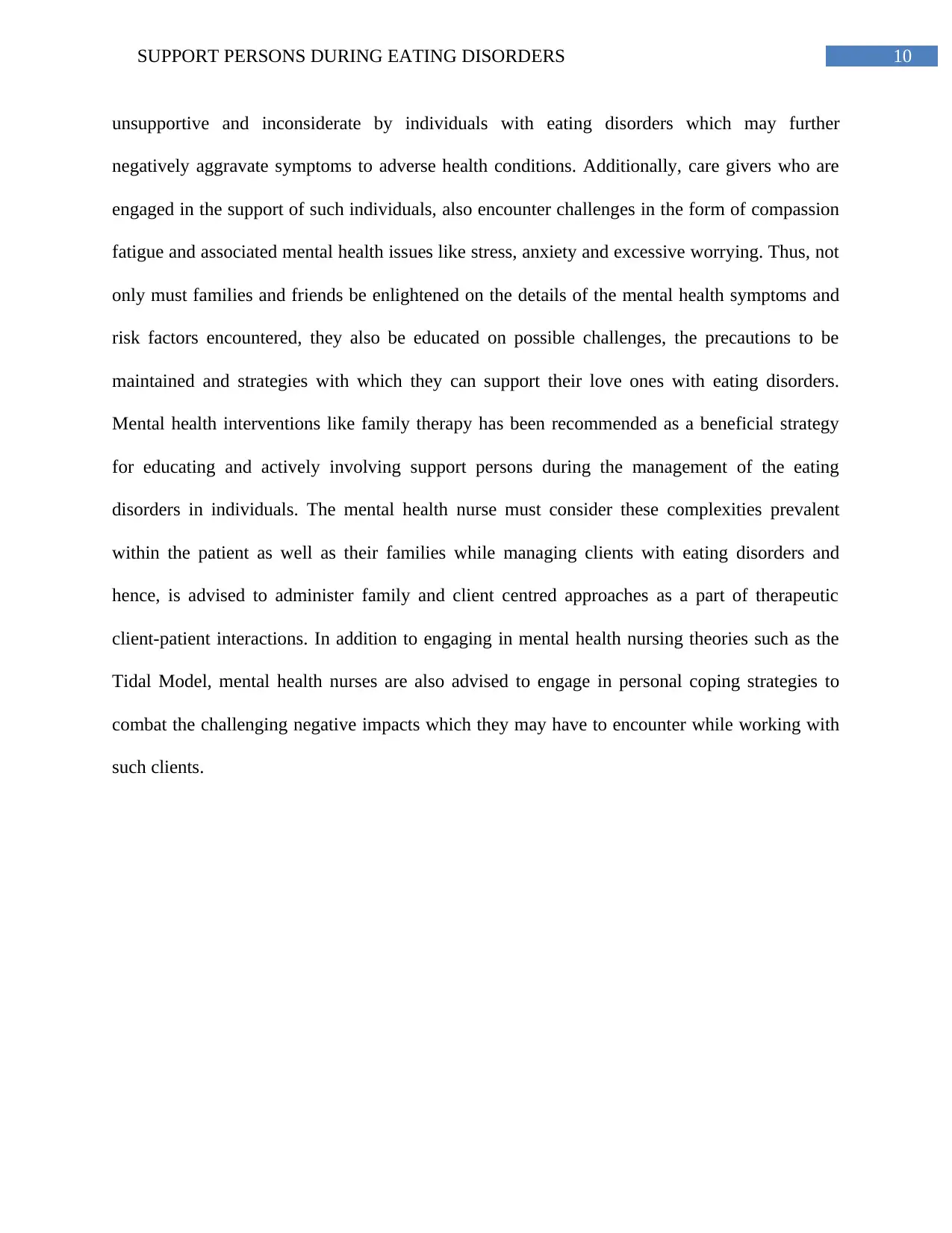
10SUPPORT PERSONS DURING EATING DISORDERS
unsupportive and inconsiderate by individuals with eating disorders which may further
negatively aggravate symptoms to adverse health conditions. Additionally, care givers who are
engaged in the support of such individuals, also encounter challenges in the form of compassion
fatigue and associated mental health issues like stress, anxiety and excessive worrying. Thus, not
only must families and friends be enlightened on the details of the mental health symptoms and
risk factors encountered, they also be educated on possible challenges, the precautions to be
maintained and strategies with which they can support their love ones with eating disorders.
Mental health interventions like family therapy has been recommended as a beneficial strategy
for educating and actively involving support persons during the management of the eating
disorders in individuals. The mental health nurse must consider these complexities prevalent
within the patient as well as their families while managing clients with eating disorders and
hence, is advised to administer family and client centred approaches as a part of therapeutic
client-patient interactions. In addition to engaging in mental health nursing theories such as the
Tidal Model, mental health nurses are also advised to engage in personal coping strategies to
combat the challenging negative impacts which they may have to encounter while working with
such clients.
unsupportive and inconsiderate by individuals with eating disorders which may further
negatively aggravate symptoms to adverse health conditions. Additionally, care givers who are
engaged in the support of such individuals, also encounter challenges in the form of compassion
fatigue and associated mental health issues like stress, anxiety and excessive worrying. Thus, not
only must families and friends be enlightened on the details of the mental health symptoms and
risk factors encountered, they also be educated on possible challenges, the precautions to be
maintained and strategies with which they can support their love ones with eating disorders.
Mental health interventions like family therapy has been recommended as a beneficial strategy
for educating and actively involving support persons during the management of the eating
disorders in individuals. The mental health nurse must consider these complexities prevalent
within the patient as well as their families while managing clients with eating disorders and
hence, is advised to administer family and client centred approaches as a part of therapeutic
client-patient interactions. In addition to engaging in mental health nursing theories such as the
Tidal Model, mental health nurses are also advised to engage in personal coping strategies to
combat the challenging negative impacts which they may have to encounter while working with
such clients.
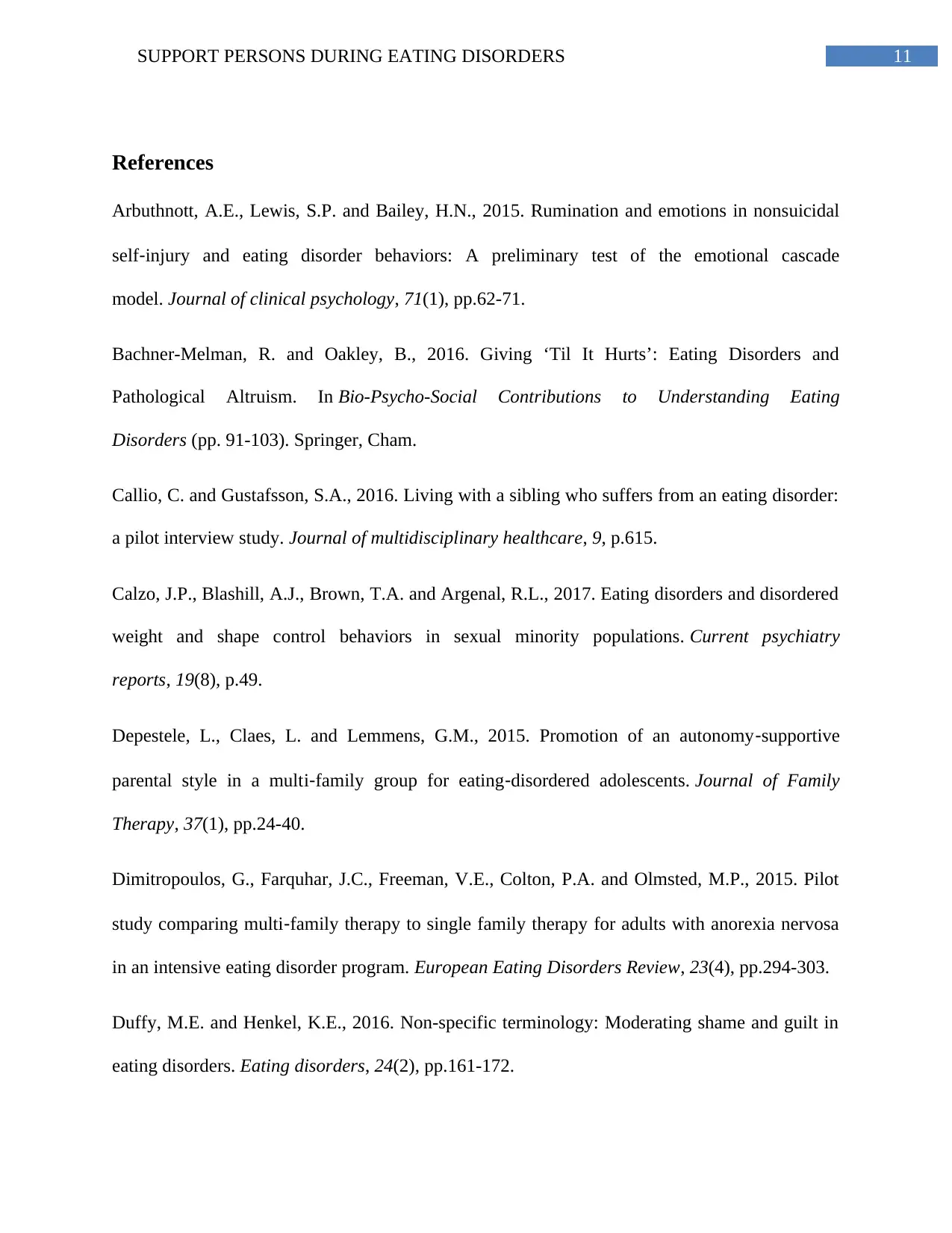
11SUPPORT PERSONS DURING EATING DISORDERS
References
Arbuthnott, A.E., Lewis, S.P. and Bailey, H.N., 2015. Rumination and emotions in nonsuicidal
self‐injury and eating disorder behaviors: A preliminary test of the emotional cascade
model. Journal of clinical psychology, 71(1), pp.62-71.
Bachner-Melman, R. and Oakley, B., 2016. Giving ‘Til It Hurts’: Eating Disorders and
Pathological Altruism. In Bio-Psycho-Social Contributions to Understanding Eating
Disorders (pp. 91-103). Springer, Cham.
Callio, C. and Gustafsson, S.A., 2016. Living with a sibling who suffers from an eating disorder:
a pilot interview study. Journal of multidisciplinary healthcare, 9, p.615.
Calzo, J.P., Blashill, A.J., Brown, T.A. and Argenal, R.L., 2017. Eating disorders and disordered
weight and shape control behaviors in sexual minority populations. Current psychiatry
reports, 19(8), p.49.
Depestele, L., Claes, L. and Lemmens, G.M., 2015. Promotion of an autonomy‐supportive
parental style in a multi‐family group for eating‐disordered adolescents. Journal of Family
Therapy, 37(1), pp.24-40.
Dimitropoulos, G., Farquhar, J.C., Freeman, V.E., Colton, P.A. and Olmsted, M.P., 2015. Pilot
study comparing multi‐family therapy to single family therapy for adults with anorexia nervosa
in an intensive eating disorder program. European Eating Disorders Review, 23(4), pp.294-303.
Duffy, M.E. and Henkel, K.E., 2016. Non-specific terminology: Moderating shame and guilt in
eating disorders. Eating disorders, 24(2), pp.161-172.
References
Arbuthnott, A.E., Lewis, S.P. and Bailey, H.N., 2015. Rumination and emotions in nonsuicidal
self‐injury and eating disorder behaviors: A preliminary test of the emotional cascade
model. Journal of clinical psychology, 71(1), pp.62-71.
Bachner-Melman, R. and Oakley, B., 2016. Giving ‘Til It Hurts’: Eating Disorders and
Pathological Altruism. In Bio-Psycho-Social Contributions to Understanding Eating
Disorders (pp. 91-103). Springer, Cham.
Callio, C. and Gustafsson, S.A., 2016. Living with a sibling who suffers from an eating disorder:
a pilot interview study. Journal of multidisciplinary healthcare, 9, p.615.
Calzo, J.P., Blashill, A.J., Brown, T.A. and Argenal, R.L., 2017. Eating disorders and disordered
weight and shape control behaviors in sexual minority populations. Current psychiatry
reports, 19(8), p.49.
Depestele, L., Claes, L. and Lemmens, G.M., 2015. Promotion of an autonomy‐supportive
parental style in a multi‐family group for eating‐disordered adolescents. Journal of Family
Therapy, 37(1), pp.24-40.
Dimitropoulos, G., Farquhar, J.C., Freeman, V.E., Colton, P.A. and Olmsted, M.P., 2015. Pilot
study comparing multi‐family therapy to single family therapy for adults with anorexia nervosa
in an intensive eating disorder program. European Eating Disorders Review, 23(4), pp.294-303.
Duffy, M.E. and Henkel, K.E., 2016. Non-specific terminology: Moderating shame and guilt in
eating disorders. Eating disorders, 24(2), pp.161-172.
⊘ This is a preview!⊘
Do you want full access?
Subscribe today to unlock all pages.

Trusted by 1+ million students worldwide
1 out of 16
Related Documents
Your All-in-One AI-Powered Toolkit for Academic Success.
+13062052269
info@desklib.com
Available 24*7 on WhatsApp / Email
![[object Object]](/_next/static/media/star-bottom.7253800d.svg)
Unlock your academic potential
Copyright © 2020–2026 A2Z Services. All Rights Reserved. Developed and managed by ZUCOL.





